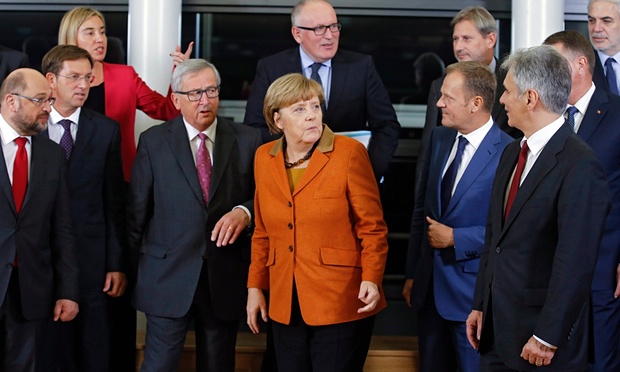The EU pledged Monday to help set up 100,000 places in reception centers along the refugee route through the Balkans, in a bid to defuse rising tensions on its eastern frontier over how to deal with the crisis.
 The EU pledged Monday to help set up 100,000 places in reception centers along the refugee route through the Balkans, in a bid to defuse rising tensions on its eastern frontier over how to deal with the crisis.
The EU pledged Monday to help set up 100,000 places in reception centers along the refugee route through the Balkans, in a bid to defuse rising tensions on its eastern frontier over how to deal with the crisis.
European Commission President Jean-Claude Juncker made the announcement after emergency talks with the heads of 10 EU nations, including German Chancellor Angela Merkel, plus the leaders of non-EU Albania, Serbia and Macedonia.
"Managing migration flows together is the only way to restore order, to slow down the uncontrolled flow of people. The uncontrolled flow of people must be stopped," Juncker told a press conference in Brussels.
The meeting comes after Bulgaria, Romania and Serbia on Saturday warned they could close their borders to stop them becoming a "buffer zone" for the tens of thousands of people streaming into Europe every day.
More than 670,000 people have reached European soil this year -- many of them fleeing violence in Syria, Iraq and Afghanistan -- in the continent's worst migration crisis since World War II.
Some 3,000 have died making the dangerous Mediterranean sea crossing and, with winter fast approaching, the fear is that more could face the same fate on the land route through the Balkans.
The reception places, to be provided with the help of the United Nations' refugee agency, the UNHCR, will help provide shelter and speed up registration of refugees, Juncker said.
Some 50,000 places will be created across Balkans countries such as Macedonia and Serbia, while the other half will be located in Greece. That includes 30,000 to be made available this year, and another 20,000 will be set up with families or in rental housing subsidised by the UNHCR.
By trying to separate genuine refugees from economic refugees, the centers would also help speed the planned relocation of 160,000 asylum seekers from overstretched Greece and Italy throughout the 28-nation EU.
Juncker issued a statement with 17 proposals, including an undertaking that no country will let refugees through to an adjoining state without first getting their neighbor's agreement.
A key element of the plan will be speeding up information exchanges between countries to coordinate efforts, especially on border controls, so as to avoid refugees inundating their neighbors as a result.
Turkey, the starting point for most of the refugees, was absent from the meeting but was on leaders' minds, with officials viewing its help as crucial in stemming the influx to Europe.
Ankara has demanded three billion euros ($3.3 billion) a year and visa-free travel for Turks in return for its cooperation.
The 10 leaders from the EU who attended the mini summit were from Austria, Bulgaria, Croatia, Germany, Greece, Hungary, The Netherlands, Romania, Slovenia and Sweden.